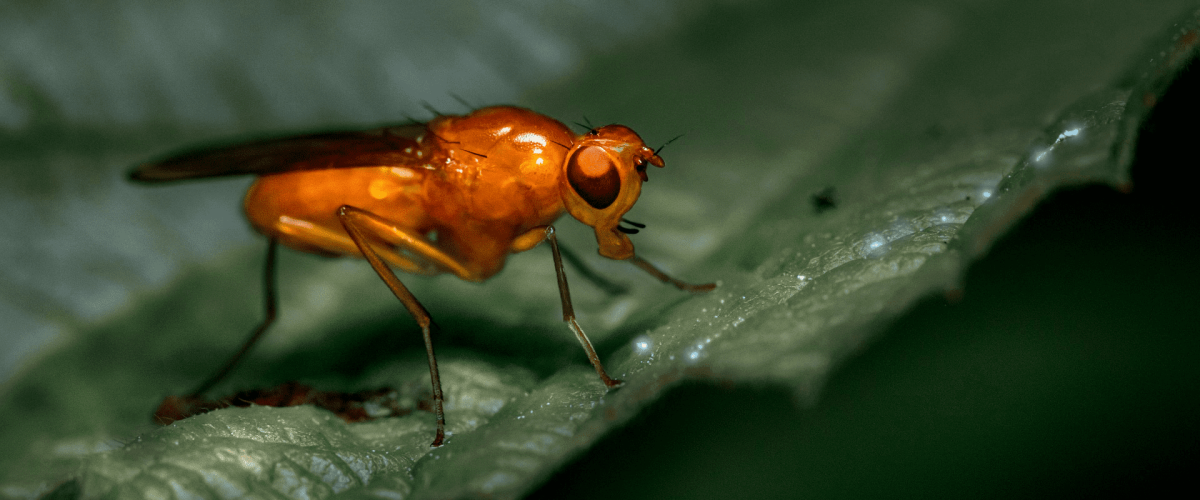The tiny, buzzing annoyance of fruit flies (Drosophila melanogaster) is something no one wants in their kitchen, whether during breakfast or while cooking dinner. Once these pests enter, they can be notoriously difficult to eliminate. But worry not — with a bit of thorough cleaning and some household items, you can keep them at bay.
Where Do Fruit Flies Come From?
Fruit flies seem to appear out of nowhere, but their arrival is mainly due to their rapid reproduction cycle. A single female can lay up to 500 eggs, which hatch in as little as 24-30 hours, leading to an overwhelming infestation within a short span.
These flies are attracted to rotting or fermenting organic matter such as overripe fruit, vegetables, or even unclean drains. Once inside, they reproduce quickly, making it essential to address the problem promptly.
Fruit Flies’ Life Cycle
Fruit flies undergo a four-stage life cycle: egg, larva, pupa, and adult. Females lay their eggs on ripening or decaying fruit, where the larvae feed before developing into pupae. This life cycle can complete in as little as 7-9 days, depending on environmental conditions, making it vital to eliminate breeding grounds swiftly.

Signs of a Fruit Fly Infestation
The most noticeable sign of a fruit fly infestation is the sight of adult flies buzzing around fruit, rubbish bins, or drains. You might also find larvae near decaying organic matter or pupae stuck to surfaces.
Do Fruit Flies Bite?
No, fruit flies don’t bite. They lack the necessary mouthparts to bite humans. Instead, they feed on fermenting organic matter, making them more of an annoyance than a physical threat.
Are Fruit Flies Dangerous?
While they don’t bite, fruit flies can pose a health risk. They often carry bacteria such as E. coli, Listeria, and Salmonella, which can contaminate surfaces and food. Proper hygiene and pest control are essential to prevent foodborne illnesses.
How to Get Rid of Fruit Flies in the House
1. Find the Source
Fruit flies are drawn to more than just fruit. Check for overlooked food items like potatoes or onions and remove any rotting produce. Eliminate their breeding grounds by discarding decaying items and keeping kitchen surfaces clean.
2. Empty Your Bins
Bins, especially those containing food waste, should be emptied and cleaned regularly. Compost bins are particularly attractive to fruit flies, so ensure they’re tightly sealed and cleaned to avoid infestations.
3. Sanitise and Close Drains
Fruit flies often lay their eggs in drains, leading to further infestations. To clean drains, use a drain cleaner or a natural solution like baking soda and vinegar. Seal drains when not in use to prevent flies from breeding inside.
4. Wash and Refrigerate Ripe Fruit
To prevent fruit flies from entering your home, wash any fruit and refrigerate ripe produce. Keeping fruit in airtight containers or fruit bowls with lids can also deter flies.
5. Set a Fruit Fly Trap
Traps are an effective way to eliminate remaining flies. You can create a simple DIY trap by filling a small container with apple cider vinegar and washing-up liquid, covering it with cling film, and poking holes in the top. Fruit flies will be drawn in but unable to escape.
6. DIY Spray
Certain essential oils like lemongrass can repel fruit flies. Mix 4 cups of water with 14 drops of lemongrass oil and spray the mixture on surfaces where fruit flies are active. You can also use basil, peppermint, or eucalyptus, which are known to repel these pests.
7. Bring in the Experts
If a fruit fly infestation becomes unmanageable, calling a professional pest control service is the best course of action. Experts use advanced methods such as fumigation or fogging to swiftly eliminate pests.
Takeaways
- Keep bins tightly sealed and clean.
- Set fly traps near entry points like windows and doors.
- Maintain clean and sanitised surfaces to prevent infestations.
- Consider calling in professional pest control services for severe infestations.
Preventing fruit flies is much easier than dealing with an infestation, so maintaining good kitchen hygiene is key.

